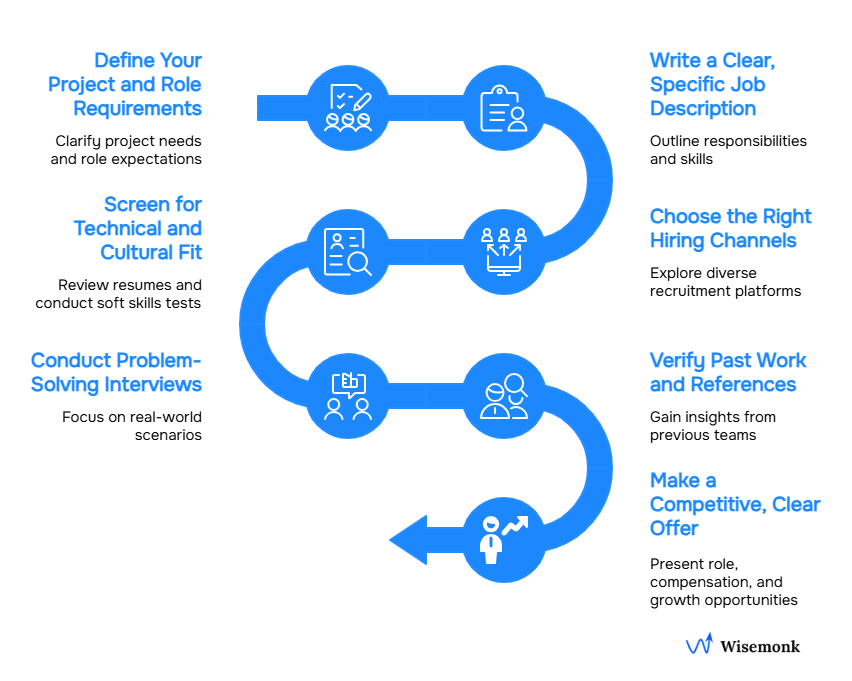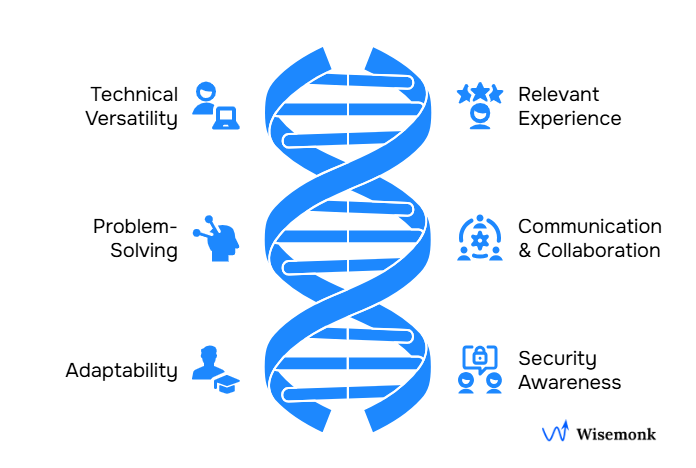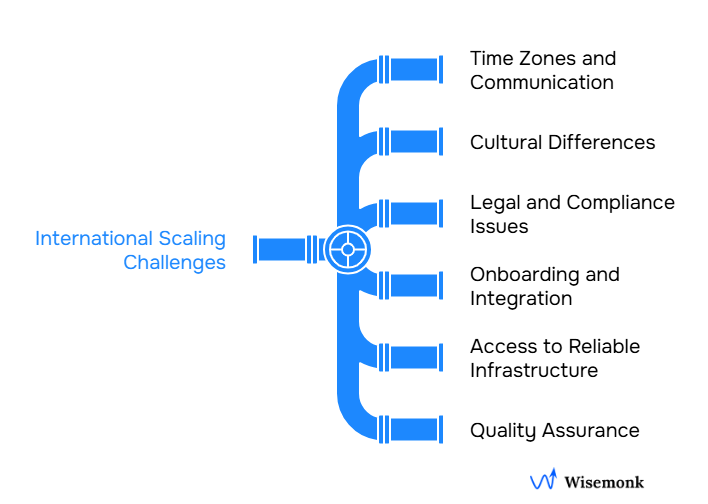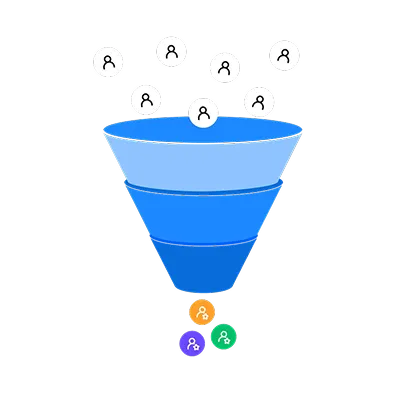Building reliable, scalable products depends on finding DevOps developers who bridge the gap between code and infrastructure. For tech-driven teams aiming to hire DevOps engineers across borders, the hiring landscape can be overwhelming. Based on our extensive work helping global companies assemble high-performing DevOps teams, we’ve designed this guide to make the process clear and achievable. You’ll discover which proven skills matter most, proven hiring steps, smart decision factors, practical cost strategies, and the real challenges of global hiring, so you can confidently build your DevOps force.
What essential skills and expertise do top DevOps Developers possess?[toc=Skills & Expertise]
In our experience helping global companies build DevOps teams, the most impactful DevOps developers bring a mix of technical proficiency and a passion for ongoing improvement. Here’s what sets them apart:
- Cloud Platform Mastery: A top DevOps developer is fluent in platforms like AWS, Azure, or Google Cloud service, ensuring your infrastructure is scalable and reliable.
- Scripting language and Automation Expertise: They leverage automation daily, using Python, Bash, or PowerShell, to streamline processes and reduce manual errors.
- Hands-on Experience with CI/CD Tools: Familiarity with tools like Jenkins, GitLab CI, or CircleCI is crucial for speeding up and securing your software release cycle.
- Containerization and Orchestration Know-How: Mastery of Docker and Kubernetes stands out, these tools are fundamental for efficiently managing modern applications.
- Infrastructure as Code Skills: Tools such as Terraform, Ansible, or CloudFormation enable them to create consistent, repeatable environments while cutting down on deployment headaches.
- Strong Security Focus: The best DevOps talent we’ve worked with prioritize security, integrating practices like secrets management and vulnerability scanning directly into their workflows.
- Analytical and Problem-Solving Abilities: True experts are relentless in diagnosing issues and fine-tuning systems for ongoing improvement.
Honestly, sometimes it’s the simple things, like great communication or a proactive attitude, that make all the difference in a real-world DevOps environment.
How to hire a DevOps Developer effectively?[toc=Hiring Steps]
Hiring a DevOps developer isn’t just about ticking tech skill boxes, it’s about finding someone who can align with your workflows, team culture, and long-term goals. You need a process that’s clear, structured, and flexible enough to adapt to your business needs. In our experience supporting companies worldwide, those that follow this kind of step-by-step approach consistently find better fits faster.

Step 1: Define Your Project and Role Requirements
Start by clarifying what you actually need, do you need help with CI/CD pipelines, infrastructure automation, or cloud migration? This shapes the entire hiring process.
Step 2: Write a Clear, Specific Job Description
Outline the responsibilities, must-have skills (such as Kubernetes or Terraform), and any industry preferences. The more focused your JD, the better your applicant pool.
Step 3: Choose the Right Hiring Channels
Beyond job boards, consider LinkedIn, DevOps communities, forums, and even employee referrals. We’ve often seen the best candidates come through niche platforms and personal networks.
Step 4: Screen for Technical and Cultural Fit
Start with a resume and portfolio review, then add a brief soft skills test, something practical that mirrors your real projects. This filters technically sound candidates early on.
Step 5: Conduct Problem-Solving Interviews
Focus on real-world scenarios rather than textbook questions. Ask how they’d handle a failed deployment, scale infrastructure, or improve an existing CI/CD pipeline.
Step 6: Verify Past Work and References
A short conversation with previous teams or reviewing live projects gives real insight into how they operate under pressure and collaborate across departments.
Step 7: Make a Competitive, Clear Offer
Once you're sure, act fast. Lay out the role, compensation, future growth, and why your team is a strong place for a DevOps expert to grow.
A structured approach like this not only improves the quality of your hires, it also speeds up the entire process.
What factors should you consider when hiring a DevOps Developer?[toc=Key Consideration]
Choosing the right DevOps developer goes beyond technical skills; you want someone able to drive your business forward while working seamlessly within your team. Having guided several clients through this process, here are the crucial factors we always recommend considering:

- Technical Versatility: Make sure candidates are comfortable with your core tools, be it AWS, Docker, CI/CD, or Infrastructure as Code. The best fit is someone who can both troubleshoot and innovate as your tech evolves.
- Relevant Project Experience: It’s not just about years on paper. Look for hands-on experience with the kind of challenges you actually face, like scaling systems, automating deployments, or managing hybrid cloud environments.
- Problem-Solving Mindset: Exceptional top DevOps engineers excel at diagnosing issues under pressure and finding efficient solutions, whether it’s a broken build or a sudden spike in traffic.
- Communication & Collaboration: Good DevOps work isn’t siloed. Developers who communicate clearly and work smoothly with both development and operations teams are consistently more effective.
- Adaptability: This field changes fast. We’ve noticed teams thrive when client hire talent open to learning new devops tools and adapting to your company’s ever-changing needs.
- Security Awareness: Make sure your next hire is proactive about security from day one, thinking ahead to protect your code, infrastructure, and customer data.
In our experience, creating a “must-have” and “nice-to-have” checklist before you start interviewing helps you focus on what matters most for your projects and shortens your hiring timeline.
How can you optimize the cost of hiring a DevOps Developer without compromising quality?[toc=Cost Optimization]
Cutting hiring costs shouldn’t mean lowering your standards, especially when it comes to DevOps roles, where deep expertise can continuous delivery bigger savings over time. Based on our experience with global teams, here are approaches that consistently maximize value:
- Consider Remote or Global Talent: Expanding your search to include remote or international candidates can lower salary benchmarks while opening up access to outstanding DevOps professionals.
- Use Freelancers for Short-Term Needs: For specific projects, hiring contractors or freelancers is often more budget-friendly than recruiting full-time staff.
- Focus on Core Skills: Zero in on essential competencies that directly impact your business needs, instead of looking for an all-in-one “unicorn.”
- Streamline the Hiring Process: Simplify steps and keep assessments relevant to save both time and money—after all, efficient hiring often leads to better hires.
- Leverage Recruitment Partners: Specialized agencies can quickly connect you to pre-vetted candidates, reducing hidden costs and time wastage.
- Design Compelling Benefits, Not Just Salaries: Work-life balance, remote flexibility, and professional growth often attract top talent as much as compensation.
By applying these practical cost strategies, your team can secure skilled DevOps talent while maintaining a strong handle on your hiring investment, ultimately supporting business growth without unnecessary overspend.
What Challenges Might You Face When Hiring DevOps Developers Globally?[toc=Challenges]
Hiring DevOps developers around the world opens up a bigger talent pool, but it also comes with its own set of hurdles. From our experience helping companies scale internationally, these are some of the most common challenges you might encounter:

- Time Zones and Communication: Collaborating across different time zones can slow down decisions and delay troubleshooting, especially for tasks that need quick coordination.
- Cultural Differences: Workflows, communication styles, and even approaches to problem-solving can vary widely between countries, sometimes leading to misunderstandings or mismatched expectations.
- Legal and Compliance Issues: Navigating local labor laws, tax requirements, and data protection regulations can be complicated and requires careful planning.
- Onboarding and Integration: Getting remote devops engineers up to speed with your onboarding processes, automation tools, and culture is often more challenging when everyone’s not in the same location.
- Access to Reliable Infrastructure: Some regions may have limited access to high-speed internet or cloud resources, which can impact productivity.
- Quality Assurance: Verifying skills and experience from afar, specially with international qualifications or freelance experience, can be tricky without a strong vetting process.
With the right preparation and open lines of communication, these challenges are manageable, and the benefits of building a high-performing, global DevOps team are definitely worth it in the long run.
Conclusion
Hiring best DevOps developers is never just a box-ticking exercise, it’s about partnering with someone who can truly elevate your technical operations and team culture. With the right strategy, clear requirements, and a pragmatic approach to global hiring, you can overcome common challenges and tap into exceptional talent. As you move forward, balancing skill requirements, cost optimization, and team integration will set your projects up for long-term success.
Ready to build your high-performing Devops team? Contact us today to discuss your hiring needs!
Frequently asked questions
What level of expertise can I expect from a DevOps developer hired through Wisemonk?
Wisemonk connects you with the top 3% of DevOps engineers sourced from leading product companies and high-growth startups. Their rigorous selection process, including detailed resume screening, recruiter interviews, and technical assessments, ensures deep proficiency in cloud platforms, CI/CD, automation, and real-world DevOps practices. You get highly skilled developers, tailored exactly to your technical and cultural needs, spanning from mid to senior level, ready to drive reliable and innovative solutions.
Why is eor service needed on an ongoing basis?
An EOR, like Wisemonk, helps you manage payroll, compliance, benefits, and HR administration for your employees in the target country, ensuring ongoing legal and regulatory adherence without requiring your own local entity.
What does the recruitment service include?
Wisemonk offers a white-glove consulting service that thoroughly understands your requirements and context, ensuring we submit only the most relevant and genuinely interested candidates for interviews. Clients receive detailed information about candidates’ previous compensation and can directly negotiate salary and long-term career prospects with the selected individuals.
How long does it usually take to get started?
The typical process from candidate sourcing to joining takes about 6 to 8 weeks, depending on notice periods and selection timelines. Onboarding with Wisemonk is fast and efficient, usually completed in less than one week once the candidate is finalized and documentation is submitted
Do you provide any guarantees for getting business outcomes?
Wisemonk provides guarantees for service quality, compliance, and talent replacement where applicable. Your company retains control over performance and work results, while Wisemonk manages administrative and compliance tasks to support your team’s success.
How is this different from staffing?
With traditional staffing, talent is often loyal to the staffing company. This can affect the quality of candidates available and typically includes high, non-transparent company margins. Wisemonk connects you directly with the talent, allowing you to negotiate salary directly. After that, Wisemonk handles local payroll and labor law compliance at a nominal cost. If you are not satisfied with our payroll services, you are free to work with the same talent through another payroll or EOR provider.
How is this different from outsourcing to a service provider company?
Outsourcing to a service provider usually means the provider manages a team or function, often with less direct control for your company. EORs allow you to retain full day-to-day management of your team while handling only the legal and administrative aspects.
How is this model different from hiring a contractor directly?
Hiring a contractor directly does not provide full employment benefits or statutory protections. EORs ensure employees receive all legal entitlements, reducing misclassification risks and ensuring compliance
When I set up my entity in India, would I be able to pay the talent directly?
You can handle payroll and payments directly once you have your own registered entity in India; until then, the EOR manages these responsibilities for you.
In which country will the talent be located?
The talent will be located in India. Wisemonk will ensure all employment and compliance is managed locally.
I want to get started. What are the next steps?
Talk to us to get started. Our team of experts is here to help you throughout your journey.
































